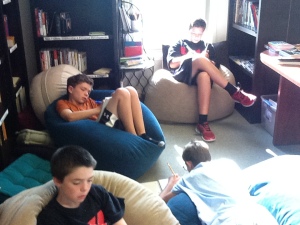Eagles are juggling up to five personal priorities/goals at the moment; some using the leadership rubrics we discussed, others struggling. Together, the class exceeded its goals of 140 Khan math skills added this week, but two Eagles failed to reach their minimum of 20 skills, so they did not earn the privilege of free time.
At Acton Academy, just like the real world, failure happens often, and is celebrated if it’s early and inexpensive, and leads to valuable lessons.
Friday we continued with our series of standardized reading and math tests, that we hope to wrap up soon (we consider these tests a necessary evil.)
On a positive note, Abigail introduced the new film project, our major writing and communication core skills challenge for the fall, which will involve pitching; story boarding, writing and shooting a film, the be show at the AAMS film festival in December.
Eagles watched trailers from the Toronto Film Festival and as they thought about their films and discussed: What is a film? What is a story? Is your life a story? What makes a good story? They explored the beginning, middle, end of a story and turning points, before dividing into groups to share ideas to compare and contrast various films.
Charlie, Ellie, Jack were elected to the first Governing Council, in a close contest, where all candidates were asked to read selections from The Prince warning about flattery. Next week – to the ranch, to apply science and math to the real world, in search of new paradigms!







